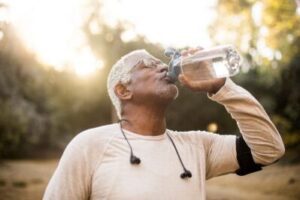The human body consists primarily of water, so you know that you need to drink water to stay healthy. In the hot summer months, you may need to drink more water to avoid dehydration.
Low hydration levels can lead to medical concerns, but it also puts your oral health in danger. Dentists and health experts agree that you should drink at least eight, eight-ounce glasses of water per day to maintain adequate hydration. You may require more than this if you lose water by sweating or if you consume dehydrating agents like caffeine.
You can feel more encouraged to drink the water you need when you understand the advantages it will bring to your smile. Read on to learn about three benefits you will notice in your oral health when you drink plenty of water.

Boost Your Dental Hygiene
Oral hygiene refers to the practice of cleaning your mouth. The natural bacteria in your mouth will form a film over your teeth throughout the day called plaque. Plaque can seriously hurt your smile, so you remove it by brushing your teeth and flossing.
Sticking to this consistent regimen will keep your smile clean and therefore preserve your dental structure. But you also consume foods and beverages that may leave substances on your smile that can contribute to plaque formation in between your oral hygiene routines.
You can drink water to rinse away lingering food particles that might otherwise allow bacteria to spread through your mouth. Sipping water will therefore give your oral hygiene a boost, further reducing your risk of dental damage. It has the added benefit of clearing away particles that might otherwise cause bad breath too.
Fight Dry Mouth
Dry mouth is an uncomfortable, sticky feeling in the mouth that occurs when your mouth does not produce enough saliva. This commonly happens when you are dehydrated. Not only does this feel unpleasant, but dry mouth also poses a risk to your oral health.
When the mouth is dry, bacteria can more easily spread across the teeth, increasing your likelihood of contracting an oral infection like gum disease. Gum disease in its early stage presents with inflammation of the gum tissue. But it will progress to deteriorate the teeth and jawbone too, putting you in danger of tooth loss and other severe dental damage.
Gum disease requires periodontal therapy from a dentist to treat. You can prevent contracting this infection in the first place by eliminating risk factors like dry mouth. Drink plenty of water to avoid dehydration which can impact saliva production.
Keep Your Teeth Strong
Water offers more wellness benefits than many popular beverages like soft drinks. It contains zero calories and no added sugar, which will help the structure of your teeth.
Sugar becomes acidic when it reacts with the saliva, and the resulting acidic environment will erode the enamel of your teeth. This will make your smile vulnerable to cavities. Drinking water rather than a sugary beverage can ensure your teeth stay strong.
Tap water also frequently contains fluoride, a natural mineral that absorbs into teeth when consumed and fortifies the enamel. Therefore, drinking plenty of water can strengthen the teeth as well, making them better able to resist decay and surface stains.
Tips for Staying Hydrated During the Summer Heat
According to the Centers for Disease Control and Prevention, daily fluid intake recommendations vary by age, sex, pregnancy, and breastfeeding. Start by drinking a cup of water each morning when you wake up or a glass before bed. Have another glass with every meal. Drink one or two cups after working out. To ward off dehydration, drink fluids gradually throughout the day.
Tricky fact—some liquids work against hydration! Drinks like coffee, sugary sodas, beer, wine and hard liquor, lemonade, sweet tea, energy drinks, smoothies, and flavored milk are all culprits. They are loaded with sugar, sodium, and other ingredients that remove water from your tissues. Consider swapping some of these out daily or rehydrating with more water for each dehydrating drink you consume.
Play a sport? Heading out on a hike? It’s essential to drink water throughout these activities. Your sweat rate, the humidity, and how long you’ve exercised are all factors to consider. Proper hydration means getting enough water before, during, and after exercise. The American Council on Exercise recommends these guidelines before, during, and after a workout:
- Drink 17-20 oz. two to three hours before you exercise.
- Drink 8 oz. 20-30 minutes before you exercise.
- Drink 7-10 oz. every 10-20 minutes during exercise.
- Drink 8 oz. no more than 30 minutes after exercise.
Our bodies are home to good and bad bacteria. They’re in our mouth, gut, and skin. Probiotics are living microorganisms found in yogurt and other cultured foods and supplements that can help improve your body’s bacteria. Taking a probiotic can help improve your immune system, protect against infection, and improve your digestion and absorption of food and nutrients—including water.
